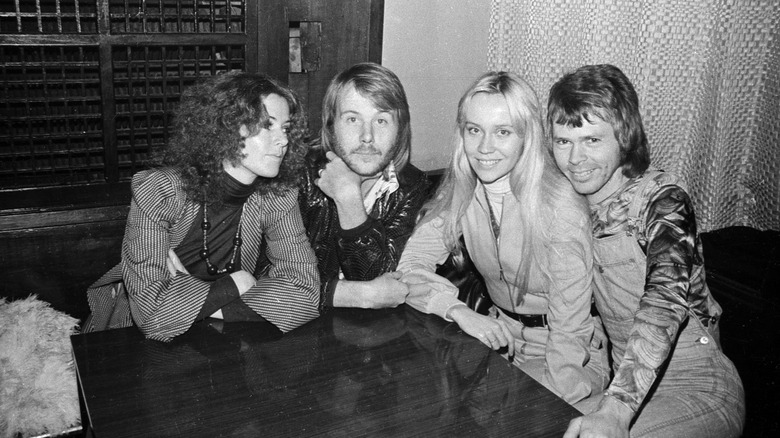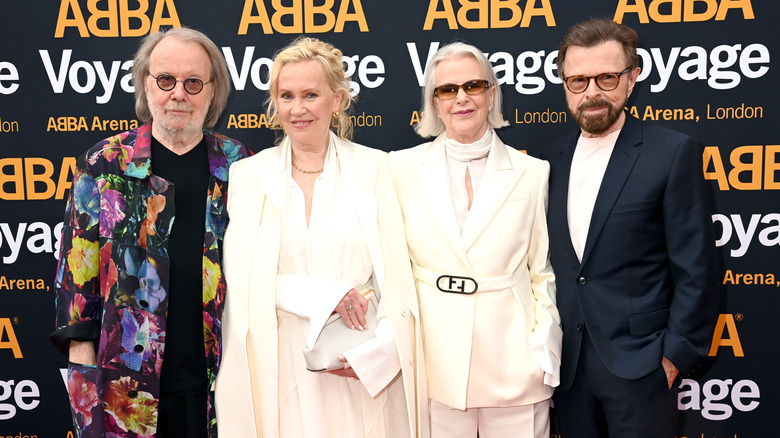The Greatest Song In The History Of Eurovision
The Eurovision Song Contest has come on leaps and bounds since it first launched in 1956. Back then, the contest included just seven countries — Netherlands, Switzerland, Belgium, Germany, France, Luxembourg, and Italy — who each entered two songs to win the top prize. However, it was considered a landmark in multinational live broadcasting and soon caught the attention of the wider European continent, and the world.
Since then, 52 countries have competed in the annual event, and today it commands a huge global audience. Many of the best-performing songs, such as "Amar pelos dois" by Salvador Sobral in 2017 and "Tattoo" by Loreen in 2024, cement their artists as international stars. However, even in today's hyperconnected world, few entrants can expect to have the incredible impact of the 1974 Eurovision winners: Abba.
The Swedish pop foursome, made up of Agnetha Fältskog, Björn Ulvaeus, Benny Andersson, and Anni-Frid Lyngstad, had been performing in various line-ups for several years prior to that year's competition, which was held in Brighton, England, in May. But it was their winning song, "Waterloo," which established them as a pop sensation, peaking at No. 1 on the U.K. chart for two weeks and laying the groundwork for a period of chart domination on both sides of the Atlantic before ABBA went on indefinite hiatus in 1982.
ABBA's 'Waterloo' breakthrough
ABBA first began to take shape way back in 1966, when keyboardist and vocalist Benny Andersson formerly of the Hep Stars joined forces with guitarist and vocalist Bjorn Ulvaeus of the Hootenanny Singers, and began to write alongside publisher Stig Anderson. At the time, both artists were making music with their partners, Anni-Frid Lyngstad and Agnetha Faltskog respectively. The two women provided backing vocals for the men's hit song "People Need Love" in 1972, which led to the four entering the song "Ring Ring" to the Eurovision Song Contest as Bjorn, Benny, Agnetha & Frida. The song came third, and the next year the foursome returned, this time combining their first initials to form the name ABBA.
"Waterloo" was written especially for the contest, and was initially titled "Honey Pie" before Ulvaeus, Andersson, and Anderson decided to use the 1815 Battle of Waterloo, in which Napoleon Bonaparte was forced to surrender his forces, as a metaphor for surrendering to love. It was first recorded in Swedish, but knowing that the European Song Contest offered ABBA the opportunity to have a global audience, they soon rewrote it in English to ensure a wider appeal. Its sound is inspired by glam rock, which was a major pop force during the mid-1970s and is modeled in part by the song "See My Baby Jive" by the British glam outfit Wizzard.
It was a recipe for success, with "Waterloo" claiming 24 points from the judging, with the second-placed song, receiving just 18. As well as the U.K., the single went to No. 1 in Belgium, Denmark, Finland, Norway, West Germany, Ireland, South Africa and Switzerland, and charted highly in several other counties including the U.S., selling almost 6 million copies worldwide.
The legacy of 'Waterloo'
"Waterloo" was ABBA's passport to pop success, however, they did not have an uninterrupted imperial run during the 1970s and 1980s. A re-release of "Ring Ring" and a fresh follow-up, "I Do I Do I Do I Do I Do," stalled on the charts in the U.K. However, their 1975 single "SOS" returned them to the Top 10 and proved to be a hit in the U.S. From there they went from strength to strength, releasing "Mamma Mia," "Fernando," and "Dancing Queen," the last of which hit No. 1 on the Billboard Hot 100.
In the 50 years since "Waterloo" emerged victorious during the 1974 Eurovision Song Contest, it has remained one of the most memorable songs in ABBA's discography and a defining song of the era. More than that, its position as the definitive song of the Eurovision Song Contest is still intact. To celebrate Eurovison's 50th anniversary, in 2005 a public poll was held for viewers in 31 European countries to find the best song ever entered into the competition, and "Waterloo" came out on top.
ABBA themselves have remained incredibly popular. In 2016, the group announced they would return to deliver an ABBA show featuring hologram avatars of their younger selves. The experience of working on the project was so enjoyable for the group that they even returned to the studio, releasing the album "Voyage" in 2021, almost 40 years after their hiatus. A statement from the band said, "it was like time had stood still and we had only been away on a short holiday. An extremely joyful experience!" (per The Guardian).

